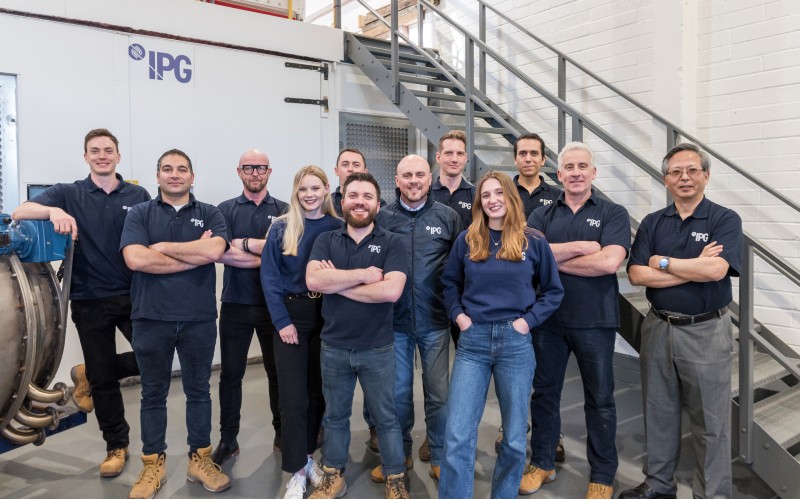IPG Energy is a company with big ambitions – and a technology to match.
The London firm has developed Flameless Combustion technology which could enable some of the world’s most polluting industries – currently reliant on diesel generators – to operate with fuel-agnostic generators which offer energy security as well as clean energy.
Each of its generators, available in 50 or 100 kilowatt modules, are housed in what looks like a shipping container. Yet if Toby Gill – who became CEO in 2020 to productise the technology – had his time again, he would have shrunk the prototypes.
“I’d have started with a two- or five-kilowatt generator. It means the cost of learning, the cost of mistakes, is a lot lower,” he tells TechBlast.
“From the same development budget, you’re going to be able to get through a lot more iterations. And at the end of the day, going from an idea to a product is about making as many iterations as you possibly can.
“There are going to be things that don’t work as well as you hoped, there are going to be things that break – and you need to go through those development cycles as quickly and as cost effectively as possible.”
He adds by way of advice to fellow hardware entrepreneurs: “Start smaller than you think you should – and I mean physically smaller. The bigger you try and make the hardware, the more expensive it is!”
Academic
After completing a PhD in Physics and Chemistry at University College London, Gill became frustrated in his first role as a postdoctoral researcher.
“My research was intangible. It was all very, very academically interesting, but it didn’t feel like it was going to be leading to anything profoundly impactful on a day-to-day basis,” he recalls. “Equally, academia is a very wide-base pyramid – there’s not much room for people coming up through the ranks.
“Fifteen years ago, I saw myself becoming a professor. I believed that that’s how I was going to have the greatest impact – but I realised the greater impact could be had from commercialising great ideas.
“The world is not lacking good ideas – it lacks execution of those ideas.”
The CEO credits his PhD with helping him to communicate complex, technical ideas in simple terms.
“Why is what we are doing important? What are the potential values of doing it? How do you communicate that to other parties – whether that’s an investor, a customer or anyone else? It’s an exercise in communication, which I really enjoy.”
Startup
He founded an AgriTech startup which planned to distribute connected sensors to subsistence farmers in sub-Saharan Africa, South and Southeast Asia, with the goal of improving crop yields and reducing costs.
“These little IoT (Internet of Things) devices would be pinging all that back to us, allowing us to draw insights across a region to then monetise that data to NGOs, governments, insurance companies,” he explains.
“After about a year we recognised that the grand dream we set off with wasn’t going to be realised. So we made a difficult decision to wind down that company.”
The venture, which did not lose any investor money, could not find a market. “The two key challenges were making those sensors cheap enough to give them to people who are making less than $1 a day; and, from the perspective of the large organisations, the less anonymised that data was, the more useful it was to them – but the less you anonymise that data, it starts to become another potential stick with which to hurt subsistence farmers,” says Gill.
“The combination of the cost and ruling out certain economic pathways forward that we felt were against the moral fibre of why we were doing the thing in the first place led us to try something else.”
Joining IPG Energy
By this point IPG Energy – second on our sister publication BusinessCloud’s EnviroTech 50 ranking this year – had a proven technology, but needed to create a product which the industry would embrace.
Gill – who joined as a business development analyst in 2017 and went on to become head of business intelligence, COO then CEO – was central to the development.
IPG Energy – Reinventing fuel-based power for the net-zero future
“The founders realised that the fuel market was going to ultimately be driven towards renewable fuel, because we want to be sustainable. But it also was going to fragment,” says Gill.
“We were going to go from a world which is dominated by diesel and natural gas to a world where there’s as many fuels as you can shake a stick at – and the answer to the question of what the fuel of the future is was going to be dependent on when and where you are in the world.
“That uncertainty and that complexity was going to make the economics of a generator that runs on a single fuel quite challenging to achieve at scale.”
Can IPG Energy break renewable energy’s chicken-and-egg cycle?
Projects
Following the completion of a £1m prototype project with National Highways and Cranfield University – delayed by COVID-19 – IPG Energy is now looking to deploy the first of its in-field product demonstrations with one of the UK’s largest construction companies.
The company, which raised £1m last year – led by GreenTribe, via crowdfunding platform Seedrs – is now looking to raise a Series A round of investment.

Reflecting on his failed AgriTech startup and success at rising star IPG Energy, Gill concludes: “Both times, I’ve consciously chosen to work on hardware.
“The adage within the startup world is ‘hardware is hard’. It is a harder investment proposition; a harder product to develop.
“But I fundamentally believe that hardware innovations are needed to tackle the world’s big problems.”


